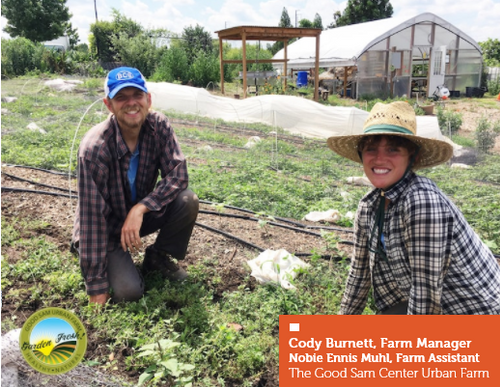Increasing Consumption of Sustainably Grown, Local Food
Health-focused organizations are collaborating with sustainable, local farmers and urban growers to meet the need for fresh, nutritious foods.
Let’s use it to help solve our diet-related challenges in Atlanta.
One in three Metro Atlanta adults is obese.
Three out of four Metro Atlanta Adults do NOT consume the recommended 2 ½ cups of fruits and vegetables daily.
Nearly one in four Metro Atlanta families with children are food insecure.
Good Samaritan Health Center (known as Good Sam), is a full-service charitable clinic nestled in Westside Atlanta’s Bankhead neighborhood. Its work centers around providing Christ-centered quality and affordable healthcare to those who need it most while providing a medical home for their patients.

Founded in 1999, Good Sam provides medical, dental, mental health counseling, health education, specialty care, and case management services for low-income families and individuals, specifically those in the 30318 and 30314 ZIP codes.
Founded in 1999, Good Sam provides medical, dental, mental health counseling, health education, specialty care, and case management services for low-income families and individuals, specifically those in the 30318 and 30314 ZIP codes.
Good Sam’s innovative approach includes incorporating locally grown food from its own one-acre farm – an oasis tucked away behind the parking lot. Following a holistic “Full Circle of Health” model to treat diet-related disease like hypertension and diabetes, Good Sam provides access to fresh produce in an area designated as a food desert. They prescribe fresh, locally grown fruits and vegetables to patients through a subsidized daily farmers market.
As Founder and CEO Dr. Bill Warren explains, “There are two types of food issues – lack of food quantity and lack of food quality. In Good Sam’s neighborhood it’s not so much a lack of quantity as it is a lack of quality. As a doctor, how can I ask my patients to eat more fresh fruits and vegetables if they can’t access them in their community? This is why we added an urban farm – because nutrition is critical for overall health.”
In the first five months of the 2017 growing season, the Good Samaritan Urban Farm has already harvested 4,200 pounds of produce. In 2016, the farm, managed by a full-time farm manager, provided 13,000 pounds of fresh produce to patients at the clinic and the wider community.
Through its partnership with Wholesome Wave Georgia, Good Sam is able to sell garlic, tomatoes, peppers and carrots grown at the farm at double value for SNAP/EBT customers through the Georgia Fresh For Less program.
Good Sam also offers several educational health and wellness initiatives, including its Fruit andVegetable Prescription (FVRx) program, which aims to prevent and treat chronic diet-related diseases in patients. This includes the Eat Well, Live Well program in partnership with OpenHand and Wholesome Wave Georgia, and the Lunchbox Life Series in partnership with theLunchbox Lifestyle.
Patients enrolled in the FVRx program attend clinical visits to outline healthy eating goals, receive “food prescriptions” that are redeemed for fresh fruits and vegetables at Good Sam’s farmers market, and learn how to prepare and eat healthy meals through cooking classes using Open Hand’s Cooking Matters curriculum.
In 2016, Good Sam’s FVRx program is estimated to have provided nearly 170 Atlantans with increased access to affordable, healthy food options. On average, participants’ waist circumference, body weight and BMI measurements decreased over the course of the program. Participants also reported increases in knowledge around the importance fruits and vegetables play in their family’s diet and how to prepare fresh produce.
The FVRx program is now its second year of implementation in 2017, with a total of 48 of patients enrolled in the program at Good Sam, according to Sara Berney, Executive Director atWholesome Wave Georgia. "Good Samaritan Health Center is leading the way with innovative programming that ties together the production, distribution, and consumption of healthy food to improve patient health outcomes,” says Berney. “Wholesome Wave Georgia's partnership with Good Samaritan Health Center, which brings the Georgia Fresh for Less and Fruit and Vegetable Prescription programs to its patients, is already a model of success in year two of implementation. Through participatory, skills-based nutrition and cooking education, access to healthy food, and a direct connection to farmers, Good Samaritan patients are consuming increasing amounts of fresh fruits and vegetables, losing weight and investing in the local food economy.”
From doctor's visits, to farmers market purchases, to education on fitness and healthy eating,Good Sam is striving to provide a full circle of healthcare all in one location at affordable prices.



Food Well Alliance wants to hear from urban farmers, local food entrepreneurs and distributors about challenges and opportunities to scale and increase access to locally grown food.
Here is what we have heard from the community so far:
What are your ideas for removing these barriers?
• Low income and diet-related diseases are inextricably linked, and people with the greatest vulnerability to diet-related chronic diseases have the least amount of money to purchase food.
• Local food is often perceived as niche, expensive and exclusively for higher-income people.
• Many school cafeterias face obstacles in incorporating food grown in their own school gardens into their menus.
• Our schools lack a standardized garden-based environmental education curriculum that integrates with Farm to School nutritional programming.
Imagine if we worked together to make this happen in Metro Atlanta:
• Broader marketing of incentive programs like Wholesome Wave Georgia’s “Fresh for Less” program by social service providers and local government agencies, raised awareness, resulting in more low-income Atlantans purchasing healthy food produced by local farmers.
• Health clinics and hospitals partnering with sustainable, local farms to serve patients with diet-related diseases in food-insecure areas of Atlanta.
• Schools have budgets that support full-time staff educators in garden-based and food systems curriculum, to alleviate burden on teachers.
• Mobile markets supported by county governments that collaborate with nearby urban farms and gardens to provide nutritional education and deliver sustainably-grown produce to low-access communities.